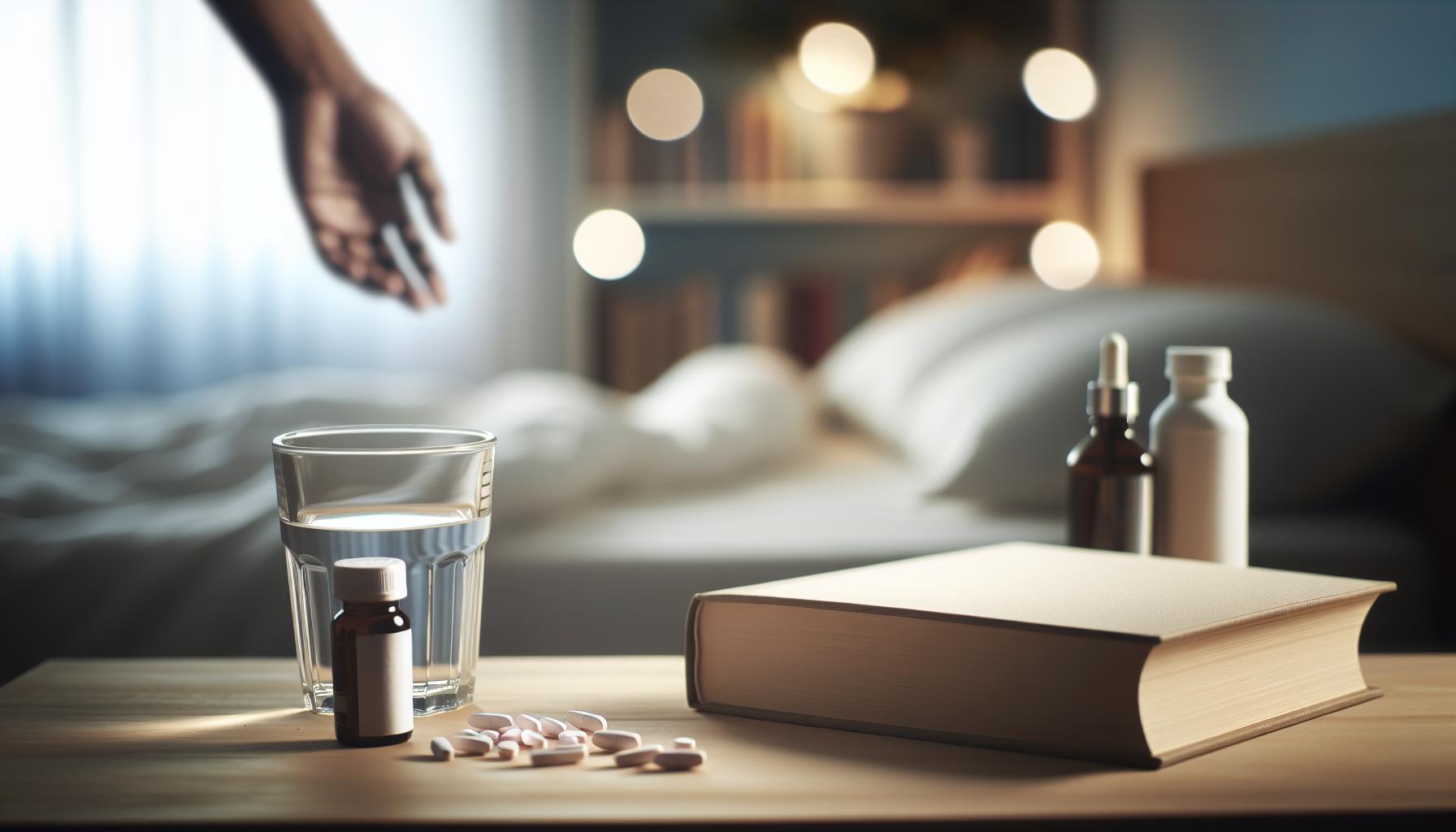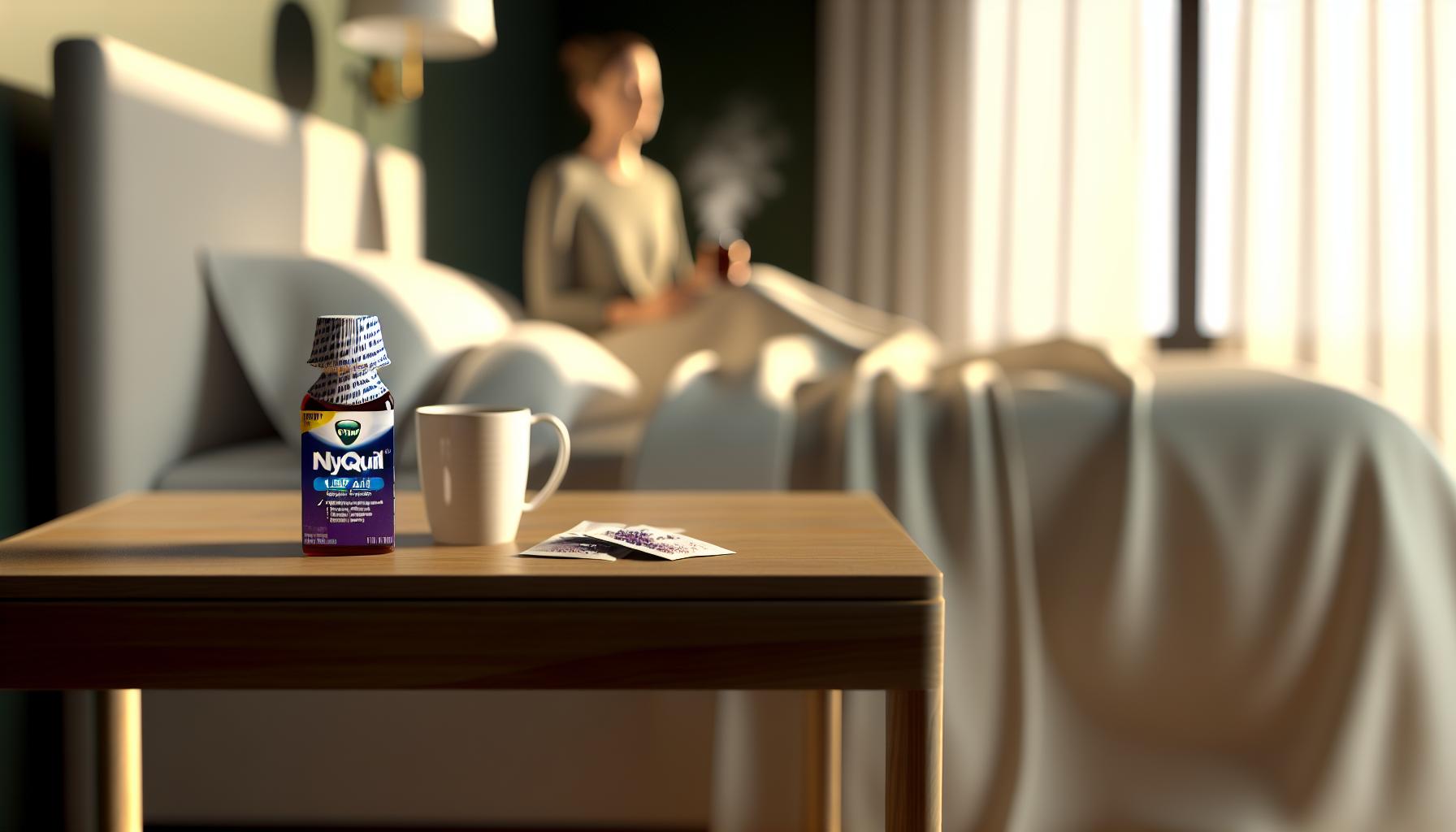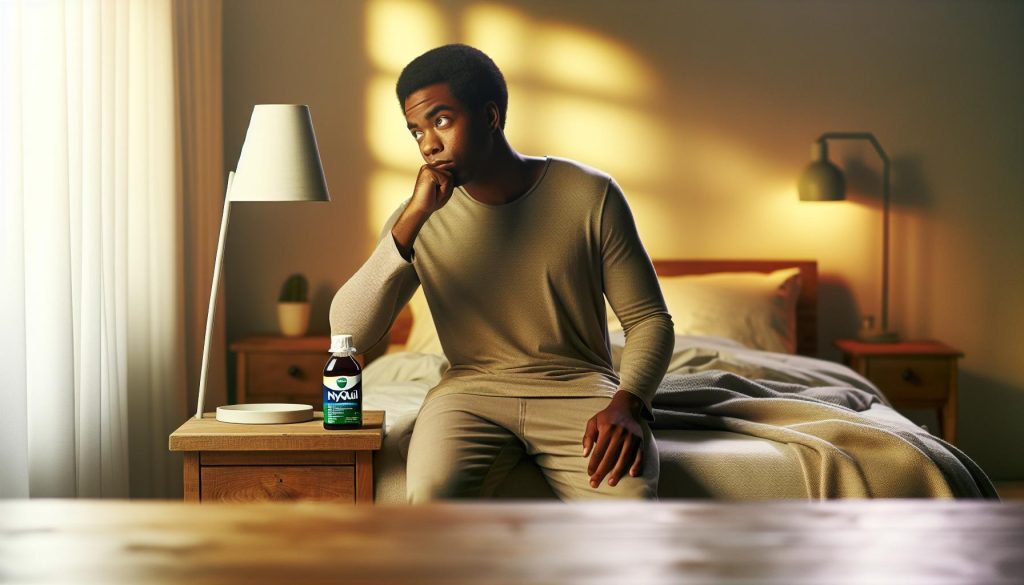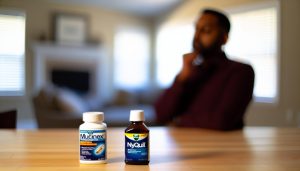Many people reach for NyQuil not just to relieve cold symptoms but also in hopes of catching some much-needed sleep. However, understanding whether NyQuil can effectively help you sleep is crucial for making informed health choices. With ingredients like doxylamine, which is typically used as a sleep aid, the temptation to use it for sleep is real. Yet, relying on NyQuil for restful nights might not be the best solution, as its primary purpose is to relieve flu and cold discomfort. In this article, we’ll dive deeper into the truth about NyQuil’s effects on sleep and discuss potential safety concerns, empowering you to make better decisions about your sleep health. So, if you’ve been wondering whether NyQuil is a viable option for sleep or if it might come with unintended consequences, keep reading to discover the facts you need.
Does Nyquil Help You Sleep Safely?
Many individuals seek out solutions for sleeplessness, often turning to over-the-counter medications like NyQuil. While it may seem tempting to use NyQuil as a sleep aid due to its sedative effects, it’s crucial to understand the implications and potential risks associated with its use for this purpose. NyQuil is primarily formulated to alleviate cold and flu symptoms, and although it may induce drowsiness, it is not recommended or safe for sleep aid purposes.
The active ingredients in NyQuil include dextromethorphan, an antitussive, and doxylamine, an antihistamine that is indeed known for its sedative properties. However, relying on NyQuil to help with sleep can lead to various issues. For instance, the possible next-day drowsiness and grogginess can interfere with daily functioning and responsibilities. Moreover, as stated in some analyses, using NyQuil frequently for sleep could lead to dependency or mask underlying sleep disorders, thereby complicating the return to natural sleep patterns [1].
Additionally, it’s important to recognize that other more reliable sleep aids, such as ZzzQuil, specifically designed for sleep, could offer quicker sleep onset without the health risks associated with misusing medications not intended for this purpose. It’s advised to consult with healthcare professionals if sleep issues persist, as they can recommend safer and more effective solutions tailored to individual needs. Individuals considering NyQuil for sleep should weigh these factors and prioritize safety and informed choices to promote healthier sleep habits in the long run.
Understanding Nyquil’s Ingredients
Many people are drawn to NyQuil for relief from cold symptoms and, surprisingly, as a sleep aid. However, can clarify why it’s not necessarily a good choice for promoting healthy sleep. The formulation of NyQuil is primarily designed to combat cold and flu symptoms, so while it might seem effective for inducing drowsiness, it has implications that merit deeper exploration.
NyQuil contains several active ingredients: dextromethorphan, which is an antitussive that helps reduce coughing, and doxylamine, an antihistamine known for its sedative effects. Doxylamine is the component that can lead to feelings of drowsiness; however, it’s important to note that it can also produce unwanted side effects, such as dry mouth and blurred vision. While some might find themselves falling asleep more easily after taking NyQuil due to its sedative properties, this reaction can vary vastly from person to person.
A major concern is the role that NyQuil’s formulations play in sleep patterns. Although it might help you fall asleep temporarily, the reliance on it for sleep can create a crutch that masks underlying sleep disorders rather than addressing the problem. This masking effect can lead to dependency and a cycle of disrupted sleep as users may need to continuously increase the dosage over time to achieve the same drowsiness. Moreover, users report lingering drowsiness the next day, which can disrupt daily activities, making it more challenging to focus or engage fully in life’s demands.
Considering these factors, it becomes clear that while NyQuil can induce sleepiness, it is not a safe or sustainable sleep aid. For individuals seeking better sleep solutions, it’s often preferable to explore alternatives specifically developed for sleep support, such as melatonin or other sleep-specific over-the-counter options. Engaging with healthcare professionals to determine the most suitable approach for individual needs is highly recommended to foster healthier sleep habits.
The Science Behind Sleep and Medication
The complex relationship between sleep and medication often leads individuals to seek out over-the-counter remedies like NyQuil, which is predominantly marketed for cold and flu relief. NyQuil includes ingredients such as dextromethorphan, an antitussive to alleviate coughs, and doxylamine, an antihistamine known for its sedative effects. While doxylamine can induce drowsiness, using NyQuil as a sleep aid raises questions about its safety and effectiveness, especially since it was not explicitly designed for that purpose.
Understanding the science behind sleep requires recognizing how various compounds interact with the body’s systems. Sleep is regulated by intricate biological processes and neurotransmitters. Doxylamine works by blocking histamine H1 receptors, which can result in sedation. However, this sedative effect is not uniform across individuals; some may find relief, while others could experience side effects like dry mouth, dizziness, or impaired cognitive function the following day. This inconsistency poses a significant challenge for those using NyQuil frequently to manage sleep issues.
Moreover, habitual reliance on medications like NyQuil can interfere with natural sleep patterns and might lead to a cycle of dependency. Users may find themselves needing increasingly larger doses to achieve the same calming effects, which can ultimately exacerbate their sleep difficulties rather than resolve them. This dependency is compounded by the potential for “hangover” effects, where the morning after use, individuals may feel groggy or unfocused, further impairing their daily productivity and quality of life.
For those struggling with sleep, it’s crucial to explore sleep-aid options specifically designed for that purpose-like melatonin or other sleep-specific supplements-which may provide a more sustainable and effective solution. Consulting healthcare professionals for personalized guidance can lead to tailored strategies that address underlying sleep disorders, without resorting to a medication not primarily intended for that purpose. Empowering oneself with knowledge and professional advice can facilitate healthier sleeping patterns and improve overall well-being.
Nyquil Versus Other Sleep Aids
Using NyQuil as a sleep aid may seem like a convenient solution, especially when you’re battling cold or flu symptoms, but it’s essential to recognize how it stacks up against other sleep aids designed specifically for insomnia or sleep disturbances. Unlike NyQuil, many of these alternatives are formulated to promote sleep without the potential side effects associated with combining medications aimed at treating primary illness symptoms.
Over-the-counter sleep aids such as melatonin, valerian root, and antihistamines that are marketed specifically for sleep (e.g., diphenhydramine) can offer more targeted support. For example, melatonin helps regulate the body’s natural sleep-wake cycle, making it a more suitable choice for those experiencing difficulty falling asleep due to circadian rhythm issues. In contrast, while doxylamine in NyQuil can induce sleepiness, it is primarily used for treating allergies and cold symptoms, so relying on it for sleep can lead to unintended side effects like residual grogginess or confusion the following day, which can impact daily functioning and productivity.
When comparing NyQuil to sleep-specific alternatives, consider the following points:
- Effectiveness: Many dedicated sleep aids have undergone clinical studies to demonstrate their efficacy, while NyQuil has been primarily tested for flu and cold symptom relief.
- Side Effects: Dedicated sleep medications pose fewer risks for adverse effects as they’re crafted to minimize drowsiness upon waking.
- Dependency Risk: Regular use of NyQuil as a sleep aid may lead to dependency or increased tolerance over time, necessitating higher doses for the same effects, while dedicated sleep aids are typically balanced against this risk when properly used.
- Formulations: The targeted formulations of sleep aids lead to different interaction effects on sleep cycles, providing a potentially more restorative experience.
Ultimately, while some may find temporary relief from insomnia-like symptoms using NyQuil, the long-term consequences can be detrimental to sleep quality. Consulting a healthcare professional for tailored sleep solutions can enhance your chances of restoring healthy sleep patterns effectively and safely. Understanding these differences empowers you to make informed decisions regarding your sleep health, prioritizing a restful night without unnecessary complications from medications not intended for that purpose.
Common Misconceptions About Nyquil
Many people mistakenly believe that NyQuil provides a safe and effective solution for sleep issues, especially when combined with cold or flu symptoms. However, this widely held view overlooks the distinct purposes and implications of using NyQuil. While it contains ingredients like doxylamine, which can induce drowsiness, it is primarily formulated to treat cold and allergy symptoms, not specifically for sleep disturbances. Relying on NyQuil as a sleep aid may not only lead to unwanted side effects but also decrease its effectiveness over time.
One common misconception is that all nighttime medications can safely help you sleep without consequences. Unlike specialized sleep aids that target sleep regulation, NyQuil’s drowsiness-inducing ingredients can leave users feeling groggy the next day, diminishing their cognitive performance and daily productivity. This can be particularly problematic for individuals who have responsibilities the next morning, as the residual effects can hinder their ability to function optimally.
Additionally, there’s a prevalent belief that using NyQuil for sleep won’t lead to long-term dependency. In fact, frequent use can create a cycle where users find it increasingly difficult to sleep without the aid of the medication, leading to increased dosage requirements. This can result in a dangerous pattern of reliance, making it crucial for individuals to be aware of the risks associated with regular use as a sleep aid.
It’s essential to approach sleep solutions holistically and consider alternatives specifically designed for sleep. Natural supplements like melatonin or valerian root, and even lifestyle modifications such as improved sleep hygiene, often present safer and more effective choices. Always consult a healthcare professional when considering the best approaches for your sleep health, ensuring a tailored solution that aligns with your individual needs.
Potential Side Effects of Nyquil Use
Taking NyQuil as a sleep aid might seem convenient, especially when grappling with cold symptoms and sleeplessness. However, it can lead to various side effects that users should be cautious of. NyQuil contains several active ingredients, including doxylamine, which is an antihistamine known for its sedative properties. While this may help induce sleep, it can also bring about a range of undesired effects that make it less than ideal for regular use.
Those who use NyQuil frequently may experience a number of potential side effects, including:
- Next-Day Drowsiness: Perhaps the most common side effect, users often report lingering grogginess, making it difficult to function the next day.
- Cognitive Impairment: Drowsiness can extend beyond sleepiness, impacting memory, attention, and overall cognitive function.
- Dizziness and Confusion: These symptoms can particularly affect older adults, increasing the risk of falls or accidents.
- Dependency Risks: Relying on NyQuil can create a psychological pattern where one feels unable to sleep without it, leading to increased usage and potentially higher doses.
- Digestive Issues: Some users report experiencing constipation or upset stomach, which can interfere with overall well-being.
Additionally, individuals with existing health conditions such as asthma, glaucoma, or prostate problems should be particularly cautious, as NyQuil can exacerbate these issues. Diabetics and those with liver conditions also need to be aware, as the product contains high levels of sugar and acetaminophen, which can strain the liver.
Considering these potential side effects, it’s crucial to consult with a healthcare professional before deciding to use NyQuil as a sleep aid. They can provide guidance on safer alternatives, such as over-the-counter sleep medications or lifestyle modifications aimed at improving sleep hygiene. It’s essential not just to seek immediate relief but to consider the long-term effects on health and well-being.
How Nyquil Affects Different Sleep Types
The interaction between NyQuil and different types of sleep patterns is a point of concern for many who might consider using it as a sleep aid. Studies suggest that while NyQuil may help some individuals fall asleep faster due to its antihistamine component, doxylamine, it doesn’t guarantee restorative sleep. Instead, the sedative effects can sometimes mask underlying issues without addressing the quality of sleep itself.
Understanding the stages of sleep is essential when evaluating NyQuil’s impact. Sleep is categorized into two main types: REM (Rapid Eye Movement) sleep and non-REM sleep. Medications like NyQuil may induce drowsiness, helping some people to quickly enter non-REM sleep; however, the use of antihistamines can disrupt the natural sleep cycle. Users often report experiencing less time in the deeper stages of sleep, which are crucial for physical recovery and cognitive function. This disruption can lead to feelings of fatigue upon waking and compromises overall sleep health.
Furthermore, for individuals suffering from insomnia or other sleep disorders, relying on NyQuil could potentially lead to a pattern of intermittent sleep rather than achieving consistent, restful nights. The risk of developing a psychological dependence on the medication can create a false perception of its efficacy as a sleep aid, potentially exacerbating sleep issues in the long run. It’s always prudent to consult healthcare professionals before incorporating such aids into your routine, as they can offer personalized insights tailored to your specific sleep needs.
In conclusion, while NyQuil might provide short-term relief for occasional sleeplessness, its effect on sleep quality can be detrimental, emphasizing the importance of seeking proper guidance and exploring healthier, more sustainable sleep solutions.
Best Practices for Using Nyquil for Sleep
Using NyQuil as a sleep aid may seem like a quick fix for sleepless nights, but it’s essential to approach this option with caution and informed strategies. While some people report falling asleep faster after taking NyQuil, relying on it regularly can mask underlying issues and disrupt natural sleep patterns. Here are some best practices if you consider using NyQuil occasionally for sleep.
Consult with a Healthcare Professional
Before using NyQuil for sleep, it’s critical to discuss your situation with a healthcare provider. They can evaluate your specific circumstances and provide personalized recommendations. They may suggest safer and more effective alternatives that target the root causes of your sleep issues.
Use Only as Directed
If you decide to use NyQuil, adhere strictly to the dosage instructions on the packaging or those given by your healthcare provider. Overuse can increase the risk of side effects and dependency. Consider using NyQuil only when necessary, such as on rare occasions when a cold or flu symptoms coincide with sleep difficulties.
Create a Conducive Sleep Environment
Enhancing your sleep environment can significantly improve your ability to fall and stay asleep. This includes:
- Darkening the room: Use blackout curtains to eliminate light that could disturb your sleep.
- Maintaining a comfortable temperature: Keep your bedroom cool, as a cooler environment promotes better sleep.
- Minimizing noise: Consider using white noise machines or earplugs if noise is an issue.
Limit Other Stimulants
Avoid consuming caffeine or other stimulants in the hours leading up to bedtime. Instead, cultivate a calming pre-sleep routine that might include reading or gentle stretching. These practices can promote relaxation and improve the effectiveness of any sleep aids you may consider using.
By integrating these practices into your routine, you can better navigate the complexities of using NyQuil for sleep while prioritizing your overall health and well-being. Always remember that sustainable sleep solutions often involve lifestyle changes and professional guidance rather than reliance on medication.
Natural Alternatives to Nyquil for Sleep
Exploring can lead to healthier and more sustainable solutions for sleepless nights. While NyQuil may offer temporary relief, relying on it frequently can disrupt natural sleep patterns and lead to potential side effects. Many people are discovering the benefits of holistic approaches that not only promote better sleep but also support overall well-being.
One effective option is incorporating herbal remedies like valerian root, chamomile, and passionflower into your nightly routine. Valerian root has been used for centuries as a natural sedative. It works by increasing the levels of GABA (Gamma-Aminobutyric Acid) in the brain, which can help promote relaxation and reduce anxiety. Chamomile, often enjoyed in tea form, not only helps calm the mind but may also improve sleep quality. Similarly, passionflower has shown promise in improving sleep duration and quality in some studies, making it a gentle yet effective choice.
Another natural alternative lies in developing mindful practices aimed at enhancing your sleep hygiene. Techniques such as meditation and deep-breathing exercises can lower stress levels and prepare your body for rest. Implementing a calming bedtime routine, which may include activities like reading, journaling, or gentle stretches, significantly helps signal to your body that it is time to wind down.
For those seeking dietary adjustments, incorporating foods rich in melatonin, such as tart cherries, bananas, and oats, may improve sleep quality. These foods can encourage your body to produce more of the hormone that regulates sleep-wake cycles. Additionally, limiting caffeine and heavy meals before bed can ensure that your body can focus on relaxation rather than digestion.
By exploring these natural alternatives, individuals may find effective ways to improve their sleep without the risks associated with frequent use of medications like NyQuil. However, consulting with a healthcare provider before starting any new sleep regimen is crucial, as they can provide personalized advice and ensure safety when exploring options to enhance your sleep naturally.
When to Seek Professional Help for Sleep Issues
When sleepless nights become a recurring theme in your life, it’s essential to recognize when professional help is necessary. Many individuals initially turn to over-the-counter solutions like NyQuil in hopes of finding relief from insomnia or disrupted sleep patterns. However, persistent sleep difficulties can signal underlying health issues or may be related to chronic stress, anxiety, or other medical conditions that require a more tailored approach.
If you find yourself relying on NyQuil or any sleep aid more than a couple of times a week, it might be time to consult with a healthcare provider. Professional guidance is crucial, especially if you experience other symptoms such as excessive daytime sleepiness, difficulty concentrating, or mood swings. These could indicate a sleep disorder, such as sleep apnea or restless leg syndrome, which necessitates a comprehensive evaluation and specialized treatment.
Signs That Indicate a Need for Professional Consultation
- Duration of Sleep Issues: If you have trouble sleeping for more than three weeks, a professional assessment can help identify potential causes.
- Performance Impact: When lack of sleep starts affecting your daily functioning, including work performance or personal relationships.
- Coexisting Health Conditions: Experiencing chronic health issues like depression, anxiety, or hypertension could complicate sleep quality, warranting professional advice.
- Unusual Sleep Behaviors: Engaging in activities during sleep, like sleepwalking or talking, may require further investigation.
It’s important to approach sleep disturbances holistically, and a healthcare professional can not only help diagnose the issue but also recommend appropriate behavioral therapies, lifestyle changes, or medication adjustments that are safe and effective. Remember, sleep is a crucial aspect of overall health; prioritizing it by seeking expert advice is a proactive step toward achieving restorative rest.
Evaluating Long-Term Use of Nyquil for Sleep
Relying on NyQuil for sleep may seem like a quick fix for those wrestling with nightly restlessness, but the implications of long-term use warrant serious consideration. While NyQuil includes doxylamine, an ingredient known to induce drowsiness, it is primarily formulated to relieve cold and flu symptoms, not to serve as a sleep aid. Regular use for this purpose can lead to a range of complications, both physical and psychological.
One significant concern with prolonged use is the development of tolerance. As your body adjusts to the sedative effects, higher doses may be needed to achieve the same level of sleepiness, potentially leading to dependence. This can create a cycle of increased dosage and diminished returns, where the initial benefits become elusive, pushing users to seek out other over-the-counter solutions or even prescription medications. Additionally, the side effects of using NyQuil for extended periods can include grogginess, confusion, and an overall disruption of normal sleep patterns, counterproductive to achieving quality rest.
Another critical aspect is that long-term dependence on sleep aids like NyQuil can mask underlying health issues, such as sleep disorders or mental health conditions, that require professional intervention. If restlessness persists, the potential for conditions such as insomnia, sleep apnea, or anxiety disorders remains unaddressed. Recognizing when reliance on NyQuil shifts from occasional use to habitual consumption is crucial. It’s best to consider alternative sleep strategies or consult a healthcare provider for tailored advice on effective treatments, behavioral changes, or lifestyle adjustments that promote healthier sleep without the risks associated with long-term medication use.
In conclusion, while NyQuil may provide temporary relief, its use as a long-term sleep solution can lead to more complications than it solves. Emphasizing safe and sustainable sleep practices, along with seeking professional advice, is essential for maintaining both overall health and a restful night’s sleep.
User Experiences: Nyquil Sleep Aid Reviews
Many people turn to NyQuil in hopes of a good night’s sleep, often driven by the lure of its sedative ingredients. User experiences with NyQuil as a sleep aid reveal a complex tapestry of results-some find temporary relief, while others express concern over its effectiveness and potential drawbacks.
Feedback from users highlights that while certain individuals report falling asleep faster after taking NyQuil, many others feel little to no difference compared to their normal sleep patterns. For instance, a user might note, “I was hopeful that NyQuil would help me sleep through the night, but I found I still woke up just as often.” This sentiment is echoed across various reviews, with people expressing frustration over the inconsistency of results. While doxylamine-one of the active ingredients-can induce drowsiness, its effectiveness appears to depend on individual body chemistry and existing health conditions.
Moreover, there are genuine concerns regarding the long-term use of NyQuil for sleep. Users who have relied on it frequently report experiencing side effects like grogginess and confusion upon waking. One user shared, “I used NyQuil nightly for weeks, thinking it was a simple solution, but eventually, I felt more tired than ever.” This highlights the potential danger of developing a tolerance to the sedative effects, which may lead to a cycle of increasing dosages for the same effect.
It’s essential for anyone considering NyQuil as a sleep aid to consult with healthcare professionals, especially if sleep issues persist. Users are encouraged to explore healthier, more sustainable sleep practices, as relying on NyQuil could mask underlying conditions that warrant professional evaluation. Taking a holistic approach to sleep-incorporating lifestyle changes, relaxation techniques, and possibly natural alternatives-might yield more effective long-term results. Remember, what works for one person may not work for another, and prioritizing personal health and safety can guide you toward better sleep solutions.
Faq
Q: Can NyQuil be used as a sleep aid?
A: NyQuil contains ingredients like doxylamine that can cause drowsiness, making it effective for sleep in some individuals. However, reliance on NyQuil for sleep is discouraged due to potential side effects and the risk of misuse [2].
Q: How does NyQuil compare to traditional sleep aids?
A: Unlike traditional sleep aids, which target insomnia specifically, NyQuil is primarily a cold and flu remedy. Using it for sleep may not be as effective or safe long-term compared to dedicated sleep medications [2].
Q: Why might someone experience side effects when using NyQuil for sleep?
A: Side effects from NyQuil can include dizziness, constipation, and prolonged drowsiness. These can interfere with sleep quality and overall health, especially if used frequently without medical guidance [2].
Q: What are safer alternatives to NyQuil for sleep disorders?
A: Natural sleep aids such as melatonin, valerian root, or magnesium can be safer alternatives. Establishing a regular sleep routine and practicing relaxation techniques may also enhance sleep quality without the risks associated with NyQuil [2].
Q: When should I avoid using NyQuil for sleep?
A: Avoid using NyQuil for sleep if you have certain health conditions, are taking other medications, or if you are pregnant or breastfeeding. It’s essential to consult a healthcare professional to assess your individual risks [2].
Q: How does NyQuil affect different sleep types?
A: NyQuil may not effectively address specific sleep disorders, such as insomnia or sleep apnea. Its sedative effects can alter sleep architecture, potentially reducing REM sleep quality [2].
Q: What should I do if I need to use NyQuil for sleep?
A: If you decide to use NyQuil for sleep, limit its use to occasional remedies for illness-related insomnia and consult a healthcare provider for guidance on safe use and monitoring for side effects [2].
Q: How can I improve my sleep without medication?
A: To improve sleep naturally, establish a bedtime routine, limit caffeine and electronics before bed, ensure a comfortable sleep environment, and consider relaxation techniques such as meditation or deep breathing [2].
Key Takeaways
In conclusion, while Nyquil can provide temporary relief from cold symptoms, its effectiveness as a sleep aid may vary among users. It’s essential to understand the proper context in which to use sleep medications. If you’re looking for alternatives for sound sleep, consider exploring natural remedies or consulting with a healthcare professional for personalized advice. Check out our articles on natural sleep aids and nighttime routines for more insights.
For those still curious about optimizing their sleep health, don’t hesitate to dive deeper into our resources. Subscribe to our newsletter for the latest tips on wellness and health, and share your experiences below-your feedback can help others in their journey toward better sleep! Remember, prioritizing a healthy sleep environment leads to overall well-being, so take action today and empower yourself with knowledge that supports your health goals.











